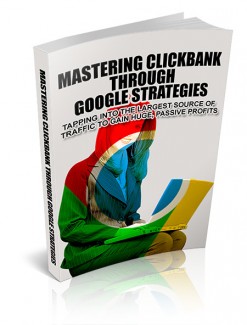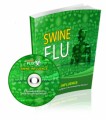 License Type: Master Resell Rights
License Type: Master Resell Rights  File Size: 2,818 KB
File Size: 2,818 KB File Type: ZIP
File Type: ZIP
 SKU: 50446
SKU: 50446  Shipping: Online Download
Shipping: Online Download
Ebook Sample Content Preview:
Chapter 6: Paid Traffic On Google Versus Free Traffic On Google
Synopsis
Many search engines nowadays have 2 primary sorts of search results: organic results (a.k.a. "natural search outcomes") are search outcomes that are accumulated based on the search engines algorithm, and are commonly influenced by a couple of factors, like the number and caliber of other sites who have decided to link to a result, the age/expertness of the web site.
The 2nd sort of search outcome is called Pay Per Click (PPC) these are advertisements that consist of businesses yielding money to the search engine to come up on top of search results if a particular keyword is searched.
Both natural search optimization (called SEO) and PPC have their benefits and disfavors and it's wise to evaluate every technique on an individual basis to see which of these may render the keenest result for the least price.
Different Choices
Adwords/PPC
Nowadays PPC ads are the basic technique by which many search engines return revenue, for the sake of this discussion I'll center on AdWords, which is Google's PPC system and is the biggest PPC system presently on the net.
PPC has a few clear benefits when equated to search engine optimization, among these is that with PPC advertisements you are able to see an almost instant result, you place an ad. You can be sure that inside minutes you'll begin to appear when individuals search for those keywords, and you'll see prompt traffic. In addition to that PPC (particularly AdWords) helps you to be in utter control of your budget.
AdWords lets you set up both an each day and an each month budget, so that you'll never spend more than you specify. The way that AdWords behaves is like an auction, where you arrange the limit that you're wishing to pay per keyword, and Google plays the auctioneer, if your limit is adequate you'll rank for your top keywords.
In terms of disfavors, among the greatest is cost, nowadays it's really costly to buy ads for competitive keywords and a few competitive keywords might wind up costing upwards of a couple of dollars, or even ten per click, and this may add up quick.
A different disfavor of PPC is that you'll only get traffic so long as you've room in your budget, when your each day/each month budgets are met you'll no longer come up till the fresh cycle begins. It's likewise crucial to note that you'll only capture traffic as long as you continue paying for ads; pay-per-click does nothing for your natural search rankings and once you quit paying your traffic will return to its former state.
As far as analyzing when and if PPC adds up, I'd suggest that there are a few conditions when I'd advise somebody to utilize this service; the first of these is if you've a brand new web site and you need immediate traffic.
A different case where it might be wise to utilize PPC is if you're able to target long tail keywords. Targeting long tail keywords will provide you the greatest bang for your dollar, but as average search volume is small on long tail keywords, you'd have to target many such keywords and handle these actively.
SEO
Concerning the benefit of utilizing search engine optimization to better your organic search rankings there are a few clear benefits, the most crucial benefit is that you're not paying for each click, and a successful SEO campaign may thus achieve a much lower cost in the long-run.
Additionally much traffic that comes to a web site from natural results is higher quality than pay-per-click traffic (individuals who click an natural result are far more probable to be interested in your product/service as likened to individuals who click PPC ads) you are able to therefore be expected to get a much larger conversion rate from your natural search traffic.
In terms of price, SEO is frequently cheaper than PPC in the long-term, but as an SEO campaign calls for at least six months to demonstrate results, it's frequently tough for many to wrap their brains around this.
A different benefit of SEO is that even following the end of a campaign you'll discover the results of the SEO for a long time, although natural search traffic is likely to decay at about the same pace as it came up. A few of the disfavors of SEO are: you don't see instantaneous results; an SEO campaign calls for at least six months to be successful.
Likewise, SEO (or rather low-cost SEO) calls for the client to be proactive; adding to the development of material (blogs, reports...) and depending upon the person this might or might not work.
It's my sincere notion that anybody who's looking to get the best long-run results ought to focus their efforts on SEO; whereas those who bear short term sites or sites that have to have a strong push at a dedicated date ought to center more on pay-per-click.
Chapter 7: Finding Good Long Tail Keywords
Synopsis
If doing your keyword search, there are basically, 2 sorts of keywords that you are able to target. These are short tail keywords and long tail keywords. You may call them blanket keywords or narrow keywords too, but generally you'll only discover the terms "keyword" or "long tail keyword". These 2 words are what I'll utilize throughout this section, merely for clarity.
The Research
Centering on long tail keywords may be a really effective technique, as you'll be targeting less competitory niche markets as opposed to a lot of the highly competitory broad keywords. Something that a lot of pros know and comprehend well, is to utilize long tail keywords that specifically target likely buyers that are late in the purchasing cycle.
You'll commonly discover long tail keywords to be between 3 and 6 words long, but may easily be longer. Let me provide a little illustration of how they work. Say you've a site that's devoted to photographs, that's a really broad keyword, and one that would be hard to rank for. Not stating it's impossible, simply that it would take time and work.
The term "photographs" would be a great example of a market but not a niche. There are millions of results that Google extracted. A lot of the sites have a page rank of 5 and 6. Essentially we have to dive in further to discover niches and sub-niches that aren't as competitory.
- File Size:2,818 KB
- License: Master Resell Rights
- Category:Ebooks
- Tags:2014 Ebooks Master Resale Rights








